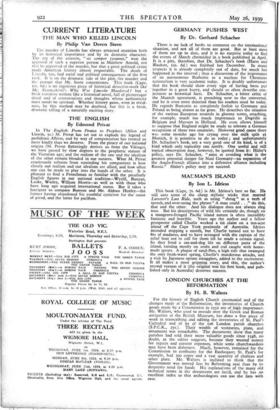This book (Cape, 7s. 6d.) is Mr. Idriess's best so
far. He still uses some of the cheap stylistic tricks that marred Lasseter's Last Ride, such as using "shrug" as a verb of speech, and over-using the phrase" A man could . . ." do this, that and the other. And his dialogue does not always ring true. But his descriptions of wild life certainly do, though on a mangrove-fringed Pacific island nature is often incredibly fantastic and horrible. Years ago the author and a fellow prospector called Charlie worked a tin claim on a ten-acre island off the Cape York peninsula of Australia. Idriess intended stopping a month, but Charlie turned out to have fits of madness, and to have arranged with the captain of the relief boat not to call for them till he made a certain signal. So they lived a cat-and-dog life on different parts of the island, existing mostly on crabs and cod caught with home- made spears. A plague of sand-flies, a high tide that swamped the only fresh-water spring, Charlie's murderous attacks, and a visit by Japanese opium smugglers, added to the excitement. It all makes a most gripping story, and this, the author's second version of it (the original was his first book, and pub- lished only in Australia) deserves success.


























































 Previous page
Previous page